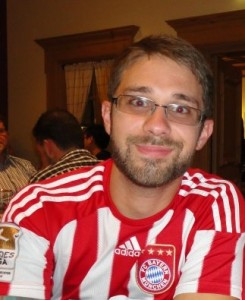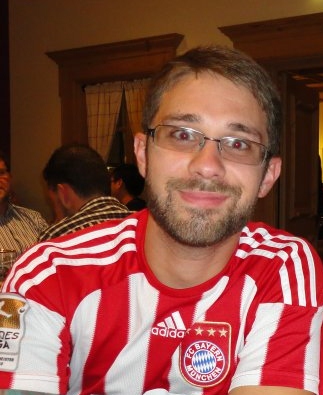Is it necessary, helpful even, to only study religion if you are not religious? Does the secular scholar of, say Hinduism, stand to be a better scholar than another with the same training but who happens to personally be Hindu? Does having a personal involvement in the group that one is studying assist one in understanding Otto’s numinous?
Why should we keep paying attention to Otto?
By Chris Duncan
Published by the Religious Studies Project, on 14th November, 2012 in response to the Religious Studies Project Interview with Robert Orsi on Rudolf Otto (12 November 2012).
In this interview with Robert Orsi, Religious Studies Professor from Northwestern University, Jonathon and Dr. Orsi discuss the seemingly evergreen writer Rudolf Otto. After a brief discussion over Otto’s more well-known ideas of the numinous and mysterium tremendum the two hit on an intriguing line of talk, one that I have been mulling over in the back of my mind for several months now without really ever noticing it much: as scholars of religion, should we ourselves be religious? Further, if we should be religious, should we be practitioners of the groups that we study? Naturally, I am restricting my definition of “we” to mean those who are non-theologians; perhaps scientists of religion would be apt also.
I have always personally held the position that no scholar of religion could honestly use that title if they were themselves religious. Maybe because specifically, the secular, non-biased scholarship was, to my eye, more brutally honest or willing to discuss the positives in addition to the negatives of particular religious traditions rather than trying to explain away the negatives. However, recently and unknowingly I may have been changing my mind. For, could someone who studies humans not also be human; must someone who studies Germans not have any form of German connections? Or, as I am beginning to think, does having a personal zeal and insider understanding of a religious tradition make one a more suitable observer/scholar?
The argument over whether religious studies should be either theological or secular study has been an on-going process for decades now, with secular study having held the upper hand for the majority of that time. With the boom of the natural sciences in the late 19th and early 20th centuries came the separation of those who study religion in order to actively participate within it, and those who study religion for non-theological purposes. In 1963, the National Association of Bible Instructors changed its name to the American Academy of Religion, and since then there has continued a steady march towards secular, non-religious scholarly study of religions. However, in the journal of this same organization, the September 2012 edition, Donald Wiebe and Luther Martin lament that though platitudes of secular, unbiased study are tossed about in public, in execution, university programs, particularly American programs, “all reveal a continuing influence of theology on the field [of religious studies] worldwide.” So, what is one to do? Is it necessary, helpful even, to only study religion if you are not religious? Does the secular scholar of, say Hinduism, stand to be a better scholar than another with the same training but who happens to personally be Hindu? Does having a personal involvement in the group that one is studying assist one in understanding Otto’s numinous?
No to the first two, but to the last; maybe.
Undeniably there must be some form of separation from observer and the object of observation but rather than have an argument over the theological or secular study of religion, perhaps scholars should be focused on a more narrow question: why does our field consider that a scholar must be Richard Dawkins-like in order to study religion? Is it not possible to study, say American Pentecostals, from an extremely in-depth, personal platform without considering this to be theology? So long as the scholar is clear about bracketing their personal ties to their subject, there should be no problem with a devout Muslim teaching courses on Islam, indeed who would be better to write a chapter on Islam than a Muslim? Perhaps our beloved field should be less concerned with labeling scholars and worrying what their personal influences MIGHT be and stick to examining the output of scholars. By continuing this internal struggle over how best to regulate the study of religion, scholars are willingly allowing our field to crumble and be overtaken by Anthropology and the Cognitive Sciences. In short, a house divided falls entirely; so let us allow theologians to preach, independently we scientists of religion can continue to write and to teach and then we can critique the finished product rather than becoming manic, wondering how to best defend ourselves from the bullies who want our funding. If religious studies is on par with the other sciences (which I believe it is) why do we not simply allow our work to speak for itself and stop being so scared of our colleagues’ possible ulterior motives? Rather than continue to debate whether Otto wrote theology or secular, scientific works on religion, let’s simply use what he wrote in the most useful manner that we can muster.
Reference:
Martin, Luther H., & Wiebe, Donald. (2012). Religious Studies as a Scientific Discipline: The Persistence of a Delusion. Journal of the American Academy of Religion, 3, 587.
This material is disseminated under a Creative Commons Attribution-NonCommercial-NoDerivs 3.0 Unported License. and can be distributed and utilised freely, provided full citation is given.
About the Author:
 Chris Duncan is currently in the final year of the undergrad Religious Studies program at Arizona State University, with an emphasis on Hinduism. He will be moving into the Graduate program in the same field next year.
Chris Duncan is currently in the final year of the undergrad Religious Studies program at Arizona State University, with an emphasis on Hinduism. He will be moving into the Graduate program in the same field next year.



